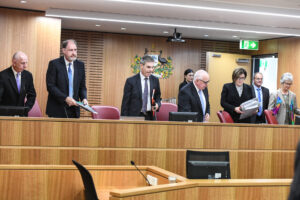Last week before the House Economics Committee, the Governor of the Reserve Bank made it clear that the current rise in inflation has nothing to do with wages growth. And yet he also made it clear he expects workers to bear the brunt of the cost that comes from slowing inflation.
In his Guardian column, Policy Director Greg Jericho notes that given real wages have already fallen for 2 straight years any further falls will take workers’ purchasing power backwards to where it was more than a decade ago. This however is viewed as being “worse than the alternative” of inflation growth above 3%.
He notes that over the past 2 years the profit margins of many industries, and most especially the mining industry, have risen and have themselves fuelled inflation. But company profits are never expected to suffer, wages however are always viewed as either the culprit of inflation or the means to reduce it. The vast increase in mining profits, largely due to the Russian invasion of Ukraine, also highlights the urgent need for a windfall profits tax.
Using the RBA’s own estimates Jericho calcuates that by the end of next year real wages will be back at 2008 levels and even with the most optimistic outlook they will not return to 2019 levels until 2030.
The Reserve Bank’s strategy of sharply increasing interest rates risk slowing the economy into a recession even though real wages are already falling faster and for longer than they have in modern times.

You might also like
The continuing irrelevance of minimum wages to future inflation
Minimum and award wages should grow by 5 to 9 per cent this year
Want to lift workers’ productivity? Let’s start with their bosses
Business representatives sit down today with government and others to talk about productivity. Who, according to those business representatives, will need to change the way they do things?
Feeling hopeless? You’re not alone. The untold story behind Australia’s plummeting standard of living
A new report on Australia’s standard of living has found that low real wages, underfunded public services and skyrocketing prices have left many families experiencing hardship and hopelessness.


